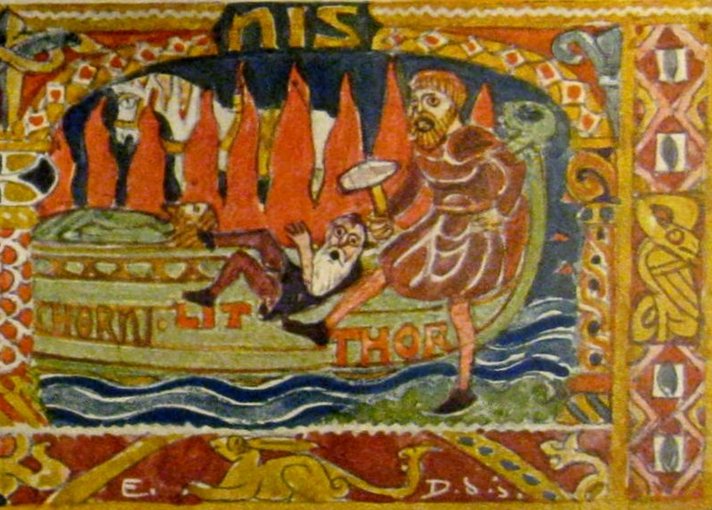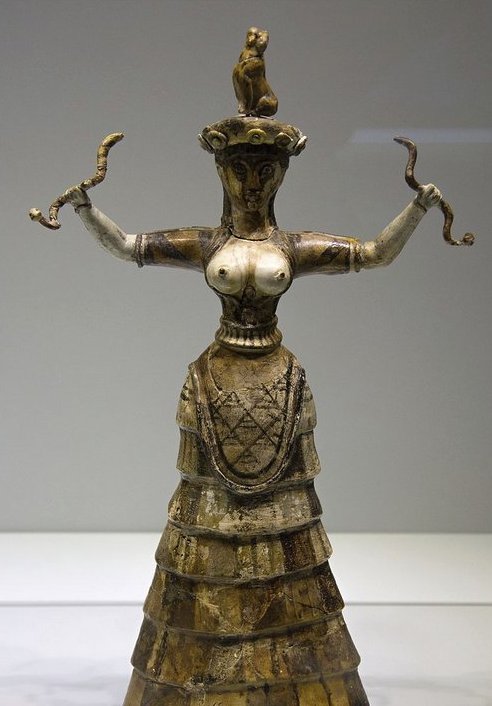245 → 184 + 61 = 181 + 64
The distance from Aldebaran to Antares was 181 days and that from Antares to Aldebaran 184 days.
... During his descent the ancestor still possessed the quality of a water spirit, and his body, though preserving its human appearance, owing to its being that of a regenerated man, was equipped with four flexible limbs like serpents after the pattern of the arms of the Great Nummo.
The ground was rapidly approaching. The ancestor was still standing, his arms in front of him and the hammer and anvil hanging across his limbs. The shock of his final impact on the earth when he came to the end of the rainbow, scattered in a cloud of dust the animals, vegetables and men disposed on the steps. When calm was restored, the smith was still on the roof, standing erect facing towards the north, his tools still in the same position. But in the shock of landing the hammer and the anvil had broken his arms and legs at the level of elbows and knees, which he did not have before.
He thus acquired the joints proper to the new human form, which was to spread over the earth and to devote itself to toil ... 245 → 95 + 150
150 → 245 - 95 150 → 364 - 214 → 245 - 95 = 364 - 214 → 245 - 95 + 364 - 214 = 150 + 150 = 300 ... Menkaure was allegedly a much more benevolent Pharaoh than his predecessors. According to legends related by Herodotus, he wrote the following: This Prince (Mycerinus) disapproved of the conduct of his father, reopened the temples and allowed the people, who were ground down to the lowest point of misery, to return to their occupations and to resume the practice of sacrifice. His justice in the decision of causes was beyond that of all the former kings. The Egyptians praise him in this respect more highly than any other monarchs, declaring that he not only gave his judgements with fairness, but also, when anyone was dissatisfied with his sentence, made compensation to him out of his own purse and thus pacified his anger. The Gods however ordained that Egypt should suffer tyrannical rulers for a hundred and fifty years according to this legend. Herodotus goes on: An oracle reached him from the town of Buto, which said 'six years only shalt thou live upon this earth, and in the seventh thou shalt end thy days'. Mycerinus, indignant, sent an angry message to the oracle, reproaching the god with his injustice - 'My father and uncle,' he said 'though they shut up the temples, took no thought of the gods and destroyed multitudes of men, nevertheless enjoyed a long life; I, who am pious, am to die soon!' There came in reply a second message from the oracle - 'for this very reason is thy life brought so quickly to a close - thou hast not done as it behoved thee. Egypt was fated to suffer affliction one hundred and fifty years - the two kings who preceded thee upon the throne understood this - thou hast not understood it'. Mycerinus, when this answer reached him, perceiving that his doom was fixed, had lamps prepared, which he lighted every day at eventime, and feasted and enjoyed himself unceasingly both day and night, moving about in the marsh-country and the woods, and visiting all the places he heard were agreeable sojourns. His wish was to prove the oracle false, by turning night into days and so living twelve years in the space of six ...
... The Pythagoreans make Phaeton fall into Eridanus, burning part of its water, and glowing still at the time when the Argonauts passed by. Ovid stated that since the fall the Nile hides its sources. Rigveda 9.73.3 says that the Great Varuna has hidden the ocean. The Mahabharata tells in its own style why the 'heavenly Ganga' had to be brought down. At the end of the Golden Age (Krita Yuga) a class of Asura who had fought against the 'gods' hid themselves in the ocean where the gods could not reach them, and planned to overthrow the government. So the gods implored Agastya (Canopus, alpha Carinae = Eridu) for help. The great Rishi did as he was bidden, drank up the water of the ocean, and thus laid bare the enemies, who were then slain by the gods. But now, there was no ocean anymore! Implored by the gods to fill the sea again, the Holy One replied: 'That water in sooth hath been digested by me. Some other expedient, therefore, must be thought of by you, if ye desire to make endeavour to fill the ocean ...
Canopus was the star at the rudder of Argo Navis and at the top of the mast was the Serpent (the Hydra constellation), its head (der Himmel) on one side of the mast and its long tail (die Erde) on the other. ... Marduk, die Frühsonne des Tages und des Jahres, wurde eben wegen dieses seines Charakters der Lichtbringer am Weltmorgen. Marduk, der die leblose, chaotische Nacht, die keine Gestaltungen erkennen lässt, besiegt, der den Winter mit seinem Wasserfluten, den Feind des Naturlebens, überwindet, wurde der Schöpfer des Lebens und der Bewegung, der Ordner des Regellosen, der Gestalter des Unförmlichen am Weltmorgen ... Die Sonne, die des Morgens das Weltmeer durchschreitet und besiegt und das Licht bringt, lässt aus dem Chaos der Nacht zuerst den Himmel, dann erst die Erde hervortreten, spaltet das gestaltlose Reich der Nacht in die zwei Hälften, den Himmel und die Erde ...
|
|||||||||||||||||||||||||||||||||||||||||||||||||||||||||||||||||||||||||||||||||||||||||||||||||
















.jpg)